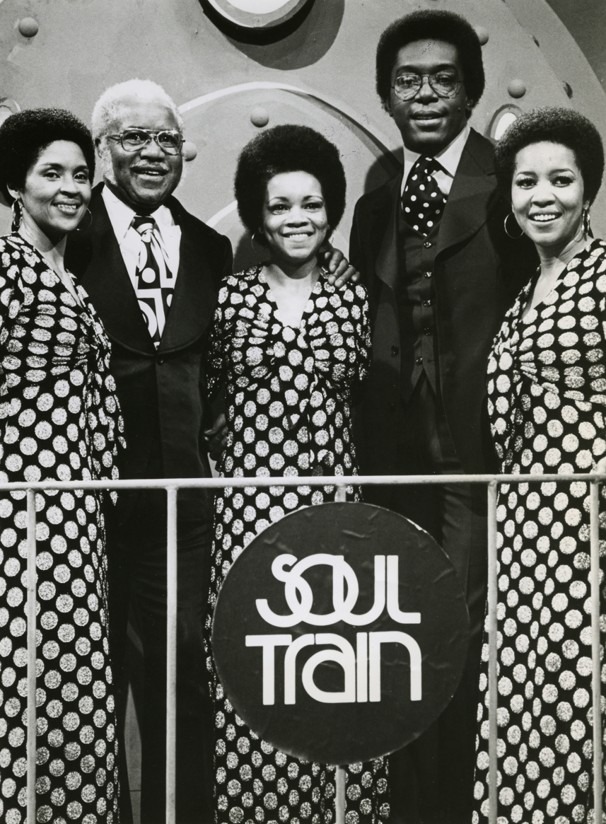A family that loves music
The family patriarch and founder of the Staple Singers was Roebuck Staples who was born in 1914 in Winona, Mississippi. Roebuck Staples had been singing and playing guitar in various gospel groups in Mississippi and then to Chicago where he settled with his own family.
Roebuck Staples soon would be the father of four children: Cleotha (b. 1934-d. 2013), Pervis (b. 1935), Yvonne (b. 1936) and Mavis (b. 1939).
In 1948 Roebuck — more affectionately known as “Pops” — began taking his two daughters Celotha and Mavis and his son Pervis to sing in front of the church attendees. The Staple Singers thus was formed.
Going professional
Four years later the Staple Singers began singing professionally. They continued to perform gospel songs in an acoustic, folksy fashion on several different labels such as United Records, Vee-Jay Records, Checker Records, and Riverside Records before landing at Epic Records in the mid-1960s.
The Staples tried to cash in on the folk boom in the 1960s, even covering Stephen Stills’ “For What It’s Worth” which was a minor hit on the pop charts at in 1967. They had earlier scored another minor pop hit “Why (Am I Treated So Bad),” written by Pops Staples.
Father-and daughters-team
In 1968, the Staple Singers signed another contract with the Memphis-based Stax label. Two years later in 1970, Pervis left, to be replaced by another Staple sibling Yvonne. The Staples Singers had now a father-daughters lineup. Also that same year Al Bell had become their producer.
In 1971, the family singers made their first dent on the R&B singles charts with “Love Is Plentiful” (at #31, R&B). But their first big hit arrived a little later that year with “Heavy Makes You Happy (Sha-Na-Boom-Boom)” which peaked at #27 on the pop singles chart and #6 on the R&B singles chart.
A string of hits, including two pop chart-toppers
Still at Stax, The Staple Singers continued to score hits: “You’ve Got To Earn It” (#97 pop, #11 R&B; 1971), “This World” (#38 pop, #6 R&B; 1972), “Oh La De Da” (#33 pop, #4 R&B; 1973), “Be What You Are” ((#66 pop, #18 R&B; 1971), “Touch a Hand, Make a Friend” (#23 pop, #3 R&B, #27 adult contemporary; 1973), “City in the Sky” (#79 pop, #79 R&B; 1974), and their biggest hits “Respect Yourself” (#12 pop, #2 R&B; 1971), “If you’re Ready (Come Go With Me)” (#9 pop, #1 R&B; 1973), and their first-ever number 1 pop and R&B hit “I’ll Take You There” (1972). “I’ll Take You There” was included on their 1972 album Be Altitude: Respect Yourself.
When Stax folded due to bankruptcy in 1975, The Staples Singers moved to Curtis Mayfield’s label Curtom Records. There, the Staples Singers scored another #1 pop and R&B hit with the Mayfield-produced track “Let’s Do It Again” in 1975. The album of the same title was their highest ever, reaching #1 on the R&B album chart and #20 on the Billboard 200.
The Staple Singers in later years; passing of Pops and Cleotha Staples
They scored other hits but most of them were in R&B chart territory, their last Hot 100 pop charting single was “New Orleans” (at #70) in 1976. That year the group was already signed to Warner Bros. label, where they issued three albums Pass it On, Family Tree and Unlock Your Mind. The Staple Singers then took three years off the limelight, and after a long hiatus returned with a new recording contract from Private I where they released the album Turning Point in 1984. The album included their cover of Talking Head’s “Slippery People” which charted lower on the pop charts.
In 1994, the group collaborated with country music singer-songwriter and artist Marty Stuart to perform a song titled “The Weight,” which was included in the compilation Rhythm, Country and Blues released by MCA Nashville. Through this project The Staples Singer somewhat found a new audience.
Sadly, the family met tragedy in 2000 when Pops Staples died of complications resulting from a concussion he sustained from a fall in his own home. Cletoha Staples passed away in 2013 after a decade of suffering from Alzheimer’s disease. Mavis Staples has continued to make music with her family as well as pursued solo projects and projects with other artists. The Staple Singers were inducted into the Rock and Roll Hall of Fame in 1999.

